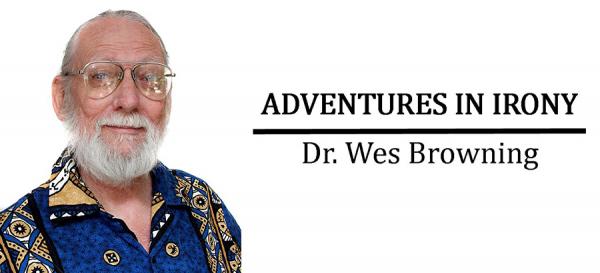
My father wanted me to grow up to be a writer in some vague way he never could explain. I’d say he succeeded in precisely his vagueness.
There were nudges here and there. We almost never spoke to each other, but he managed to get me interested in various word games.
An early one I got hooked on was what I call a word mine problem: List all the words you can make from the letters in “Washington,” for example, using them only as often as they appear. So you could use the two N’s to get “inn,” but you couldn’t get “ass” because there’s just the one S.
Then there were cryptograms. A quote or a set of related words, like “vegetable salad ingredients,” would be written using one simple substitution cipher, which you had to break. He taught me cheats like ETAONRISH, the most frequent letters, in order, used in normal English text.
He tricked me into reading the dictionary. I browsed the dictionary more than I now browse the internet. He sneakily lured me into a guide at the end of the dictionary that laid out the most common proofreading symbols. The attraction was, ‘Hey, you like symbols; here’s pages of them, all for free.’
He made sure I had access to the Encyclopedia Britannica, buying a set when I was born.
He had fellow officer buddies who came to the house to play Scrabble(™). A fourth rack was going unused, so he talked me into joining in. My father could outplay me all the time, but he enjoyed seeing me beat his two friends.
At the time, we were living at an Army base 35 miles outside of Boston, and we were subscribed to two Boston dailies. One was the Hearst paper. My father got me reading the papers daily. I don’t know how he pulled it off. I don’t even know if it was planned. The way it went down was he had a rule that no one read a section of the paper until he finished.
Well, there was just me, my mother and the dog. The dog was not considered a suitable reader of the papers. So my mother and I had to watch Dad read the A-sections, and then we could move in.
But — and here’s where he may have gotten devious — he offered to let me read the B-sections while he was reading the A-sections. On the condition I folded them back up like they were to begin.
The B-sections were the best part! They had the editorials and the letters to the editors. The A-sections were soup and salad. The B-sections were salami and cheese.
It made more sense to read the editorials first every day because they tried to make sense of the previous day’s news. The A-section just hit you with today’s news without preparation, raw and unprocessed.
Some of the editorials of those times reinforced my dictionary reading. I needed help to get through William F. Buckley’s pieces.
In his twenties, my father, who wasn’t able to go to college (it was the Depression), had a long-shot plan to get to be a writer. He signed up with the Government Printing Office (GPO) as an apprentice printer. The goal was to somehow end up owning a press and supplying his own writing to it. He told me he got the idea from Izzy Stone, somehow. I never understood that. Anyway, WWII and the draft interfered with the plan, so he became a cryptanalyst for the U.S. Army instead, which is a position all about words.
One of my father’s projects at the GPO before he was drafted was helping create a copiously illustrated monograph on color printing, which I devoured. To his dismay, I learned straight past it, branching out to other ideas about color, like the physics and biology of the subject. The encyclopedia helped. We argued about which was more important: subtractive color combination or additive.
I studied wave theory to understand physics, and then I got hooked on math. He saw me turning my back on his vague dream for me. I must have seemed to slip away into higher dimensions.
An article on algebraic geometry in the Encyclopedia Britannica made up my mind to become a mathematician.
That’s the problem with buying a newborn baby a set of encyclopedias: You never know what they’ll get out of it.
Read more of the May 8–14, 2024 issue.
No comments:
Post a Comment